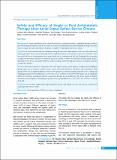Please use this identifier to cite or link to this item:
https://hdl.handle.net/20.500.14356/1103Full metadata record
| DC Field | Value | Language |
|---|---|---|
| dc.contributor.author | Adhikari, Chandra Mani | - |
| dc.contributor.author | Prajapati, Dipanker | - |
| dc.contributor.author | Bogati, Amrit | - |
| dc.contributor.author | Acharya, Kiran Prasad | - |
| dc.contributor.author | Acharya, Anjana | - |
| dc.contributor.author | Shahi, Roshani | - |
| dc.contributor.author | Shrestha, Swikirty | - |
| dc.contributor.author | Ghimire, Vijay | - |
| dc.contributor.author | Thapa, Kavindra | - |
| dc.contributor.author | Sherpa, Kunjang | - |
| dc.date.accessioned | 2023-04-24T06:14:26Z | - |
| dc.date.available | 2023-04-24T06:14:26Z | - |
| dc.date.issued | 2021 | - |
| dc.identifier.citation | AdhikariC. M., PrajapatiD., BogatiA., AcharyaK. P., AcharyaA., ShahiR., ShresthaS., GhimireV., ThapaK., & SherpaK. (2021). Safety and Efficacy of Single vs Dual Antiplatelets Therapy After Atrial Septal Defect Device Closure. Journal of Nepal Health Research Council, 19(2), 295-299. https://doi.org/10.33314/jnhrc.v19i2.3477 | en_US |
| dc.identifier.issn | Print ISSN: 1727-5482; Online ISSN: 1999-6217 | - |
| dc.identifier.uri | http://103.69.126.140:8080/handle/20.500.14356/1103 | - |
| dc.description | Original Article | en_US |
| dc.description.abstract | Abstract Background: Atrial septal defect device closure has become a standard procedure. Antiplatelet therapy is used to prevent thrombus formation in the device. There is no clear recommendation about the antiplatelets drugs. This study aims to evaluate the safety and efficacy of Aspirin vs (Aspirin +Clopidogrel) after device closure. Methods: A cross-sectional study was conducted among all consecutive adult patients (?18 years) who underwent atrial septal defect device closure from May 2019 to April 2020 and meet the inclusion criteria were included. After successful ASD device closure patients were treated with ASA or combination of ASA and Clopidogrel for six months on physician discretion. Patients were followed up for six months to observe for Transient ischemic attack, Stroke, thrombus in the device, myocardial infarction, major bleeding, minor bleeding and increases in headache episodes compared to baseline. Results: This study consisted of 130 patients: 65 in the Aspirin Group, and 65 patients in Aspirin and Clopidogrel group. There was no Transient ischemic attack, Stroke, Myocardial infarction, thrombus, major bleeding in both groups. There was no significant difference between two groups in ecchymosis; Aspirin group 4(6.1%) vs. aspirin and Clopidogrel group 3(4.6%) [Difference, 1.54% {95, % CI, -1.45%to 4.53%}]; P=0.648. There was no significant difference in increase in headache episodes compared to baseline for six months after the device closure in Aspirin Group 3(4.6%) VS Aspirin and Clopidogrel group 2 (3.0%) group [difference, 1.54% {95% CI, -1.45%to 4.53%}]; P=0.648. Conclusions: Our study suggests that single antiplatelet therapy with Aspirin is as safe and effective as aspirin and clopidogrel after device closure. Keywords: Atrial septal defect; ASD device closure; clopidogrel | en_US |
| dc.language.iso | en | en_US |
| dc.publisher | Nepal Health Research Council | en_US |
| dc.relation.ispartofseries | Apr-June, 2021;3477 | - |
| dc.subject | Atrial septal defect | en_US |
| dc.subject | ASD device closure | en_US |
| dc.subject | clopidogrel | en_US |
| dc.title | Safety and Efficacy of Single vs Dual Antiplatelets Therapy After Atrial Septal Defect Device Closure | en_US |
| dc.type | Journal Article | en_US |
| local.journal.category | Original Article | - |
| Appears in Collections: | Vol. 19 No. 2 (2021): Vol 19 No 2 Issue 51 Apr-Jun 2021 | |
Files in This Item:
| File | Description | Size | Format | |
|---|---|---|---|---|
| 3477-Manuscript-23767-1-10-20210907.pdf | Fulltext Download | 215.3 kB | Adobe PDF |  View/Open |
Items in DSpace are protected by copyright, with all rights reserved, unless otherwise indicated.
